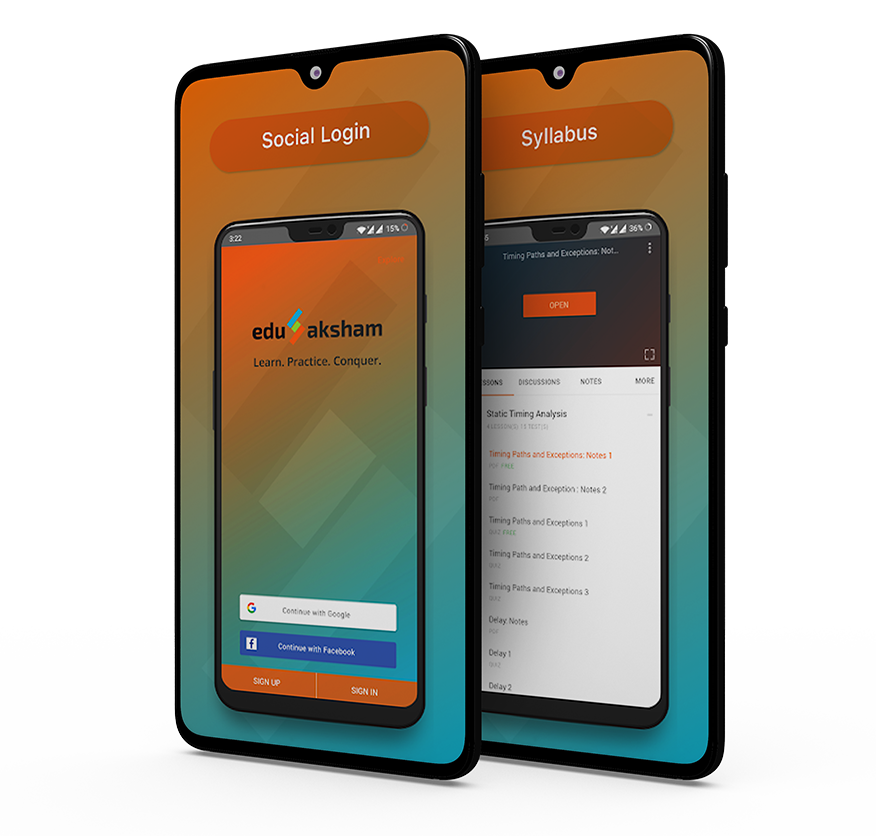
About Class 6 Program
CBSE Class 6 is one of the crucial grades in secondary school education. At this formative stage, learning needs to be effective and interests for learning has to be created in the student. Due to a lack of understanding in the subject, many kids lose interests over a period of time and they become weak in Mathematics learning. Slowly they create fear in their mind and feel Mathematics is boring and tough. Mathematics is the foundation of learning, it is a pillar which facilitates learning other critical subjects. It needs to be given proper attention at the early stage of a child’s learning. We believe every child is capable of picking the basic understanding and given right guidance they can do a lot more better in crucial subjects like Mathematics.
Our Approach


Personalized Learning
EduSaksham offers a completely personalized learning experience for every user. The system provides a unique learning experience for the user and helps them learn the concepts at their level. User can complete the lessons at his own pace and access it from anywhere on the go. Each user gets his own dashboard which helps track his performance and progress. User can access any lesson at any point of time based on his own learning needs. The system is designed in a way to support learning at every stage for every individual learner.
Close Now


Self-Paced Learning
EduSaksham provides self-paced learning courses. Users can learn the lessons at their own pace and are not left behind for any of the lessons. Each user on the platform has his own profile where content is presented to the user based on his choice. The user gets access to the entire content, and then the user can decide which lesson he wants to learn. If a learner is not able to understand the concept in one go, he has full control to playback the lessons. Moreover, the end-user may attempt any quiz multiple times until his concepts are clear.
Close Now


Modular Course Structure
The entire course structure is created in a modular structure for all the courses to enhance better learning for the students. Students learn one concept at a time. We have created smaller modules for the students so they can watch/read/practice the lessons as per their attention level. If a student wants to do more, then he can move on to the next experience quickly. Modular course structure also helps students identify their strengths and weaknesses per topics, which helps improve the overall performance of the students.
Close Now


Extensive Experimental Concepts
All our courses include a lot of experimental ideas to make students understand the topics very easily. We use our day to day life objects to draw parallels to the concepts and make students learn from our surrounding. Our science courses use a lot of experiments for the students to make the visualizations stronger for the ideas as visual memory helps them retain the concept for the more extended period. We innovatively bring our courses closer to the real life so students can learn better with their daily objects.
Close Now


Advanced Analytics
EduSaksham offers advanced analytics and reporting to every student. Our analytics help student identifies their strengths and weaknesses and helps them work on them. Our in-depth analysis helps a student identify their mistakes, areas of concern, topic-level, proficiency level, etc. We provide a lot of analytics on time management for the assessments, questions, comparative analysis, among other students to help students understand their performance. It helps in remediate or accelerate their learning and achievement.
Close Now


Quick Exam Revision
EduSaksham has provided students with excellent smart exam revision modules which help students quickly cover essential points from the chapter and get prepared fast. It will help students revise any topic quickly and practice the questions topic-wise for the chapters. These modules cover all the salient points of the chapters in a quick summary video, mind map-based notes, and a variety of good questions. These offerings help students prepare better for the exams and increase their performance.
Close Now


Doubt Clarification
EduSaksham course modules provide access to any lessons at any point in time. In case a student faces any doubt in any of the content, he can share his queries to us over our forum. Our experts will get back to him within no time. We provide complete detailed explanations for all the questions so students can get their doubts clarified instantly. Each description also links the concepts used within the problem, so if a student feels to check the content, he can directly visit the content and get his doubt clarified.
Close Now


Discussion Forum
We offer a discussion forum for students to discuss their queries if they have any. Our experts revert to the student queries and help them resolve their doubts. Fellow students can also help each other to clarify their doubts. Discussion forum helps build student community where they can learn from each other. Forum creates healthy learning environment among students. It also makes a repository of queries for the students to refer to any time in the future and get their doubts clarified on the runtime.
Close Now
Class 6 Subject

Math
- 85+ E-learning Video modules
- 250+ worksheets
- 2000+ Questions
- 85+ notes of formulas and concepts
- Detailed explanations with every question
- Different difficulty levels for each test
About Course :
CBSE Class 6 is one of the crucial grades in secondary school education. At this formative stage, learning needs to be effective and interests for learning has to be created in the student. Due to a lack of understanding in the subject, many kids lose interests over a period of time and they become weak in Mathematics learning. Slowly they create fear in their mind and feel Mathematics is boring and tough. Mathematics is the foundation of learning, it is a pillar which facilitates learning other critical subjects. It needs to be given proper attention at the early stage of a child’s learning. We believe every child is capable of picking the basic understanding and given right guidance they can do a lot more better in crucial subjects like Mathematics.
Pedagogy :
Through our e-learning course, we have made sincere attempts to build interest in the child towards Mathematics. We are teaching the basics of all the topics and its applications in real life situations. We also ensure to provide enough situations and scenarios through our practice questions for in-depth learning and thinking to begin from the formative years. Our exhaustive online video course will provide 6th class Maths study material that follows the latest CBSE syllabus. Every chapter of the subject has been meticulously designed by subject experts who have years of experience in the field of academics. We also provide worksheets to help students evaluate themselves and learn from their mistakes. Each question also comes with answers. These answers are intended to provide students with a clearer understanding of every concept in detail.
Students who have referred to our class 6 Maths course in the past have shown significant improvements in their overall marks as well as ease of understanding the concepts.
Features of the Course :
• Exhaustive practice tests
• Unlimited attempts
• Friendly self-indulging worksheets
• Progressive practice patterns
• Personalized Learning Dashboard
• Concept-wise Analytics
• Instant feedback mechanism
• All India comparison of progress
Benefits of the Course :
• Improved performance – With our scientifically designed content, you are bound to see significant improvements in your performance in mathematics.
• Attain the desired IQ – Get the desired IQ in 6th class mathematics with our exhaustive maths models for class 6 CBSE.
• Easy tracking of progress – We provide easy tracking facility to help you understand how you are progressing with every step in the course.
• Self-paced learning – Every individual has a different learning pace. Keeping that in mind, we have designed the course to be self-paced.
• Identify focus areas – You may be better in certain concepts than others. This course will facilitate you for a better understanding of the areas you need to focus more.
• Build strong foundations – With this course, we aim to help you understand every concept of the subject so that your foundation in mathematics is very strong. Solid foundation right from the formative years will help build your interest in the subject further.
• Simple parent’s supervision – Parents will be able to monitor their children’s performance easily with the features provided in the course.
• Quick re-learning – Even if you fail at solving problems, you will able to solve the problems again till you get it, thus allowing room for re-learning.
Courses Offered :
• Class 6 – Maths - Part 1 (268 lessons)
• Class 6 – Maths – Part 2 (169 lessons)
• Class 6 – Exam Revision
Syllabus :
- Chapter 1 - KNOWING OUR NUMBERS
- Chapter 2 - WHOLE NUMBERS
- Chapter 3 - PLAYING WITH NUMBERS
- Chapter 4 - BASIC GEOMETRICAL IDEAS
- Chapter 5 - UNDERSTANDING ELEMENTRY SHAPES
- Chapter 6 - INTEGERS
- Chapter 7 - FRACTIONS
- Chapter 8 - DECIMAL
- Chapter 9 - DATA HANDLING
- Chapter 10 - MENSURATION
- Chapter 11 - ALGEBRA
- Chapter 12 - RATIO AND PROPORTION
- Chapter 13 - SYMMETRY
- Chapter 14 - PRACTICALGEOMETRY
Syllabus :
1. Knowing our Numbers
1.1 Introduction
1.2 Comparing Numbers
1.2.1 How many numbers can you make?
1.2.2 Shifting digits
1.2.3 Introducing 10,000
1.2.4 Revisiting place value
1.2.5 Introducing 1,00,000
1.2.6 Larger numbers
1.2.7 An aid in reading and writing large numbers
1.3 Large Numbers in Practice
1.3.1 Estimation
1.3.2 Estimating to the nearest tens by rounding off
1.3.3 Estimating to the nearest hundreds by rounding off
1.3.4 Estimating to the nearest thousands by rounding off
1.3.5 Estimating outcomes of number situations
1.3.6 To estimate sum or difference
1.3.7 To estimate products
1.4 Using Brackets
1.4.1 Expanding brackets
1.5 Roman Numerals
2. Whole Number
2.1 Introduction
2.2 Whole Numbers
2.3 The Number Line
2.4 Properties of Whole Numbers
2.5 Patterns in Whole Numbers
3. Playing with Numbers
3.1 Introduction
3.2 Factors and Multiples
3.3 Prime and Composite Numbers
3.4 Tests for Divisibility of Numbers
3.5 Common Factors and Common Multiples
3.6 Some More Divisibility Rules
3.7 Prime Factorisation
3.8 Highest Common Factor
3.9 Lowest Common Multiple
3.10 Some Problems on HCF and LCM
4. Basic Geometrical Ideas
4.1 Introduction
4.2 Points
4.3 A line Segment
4.4 Line
4.5 Intersecting Lines
4.6 Parallel Lines
4.7 Ray
4.8 Curves
4.9 Polygons
4.10 Angles
4.11 Triangles
4.12 Quadrilaterals
4.13 Circles
5. Understanding elementary Shapes
5.1 Introduction
5.2 Measuring line segments
5.3 Angles - Right and Straight
5.4 Angles – ‘Acute’, ‘Obtuse’ and ‘Reflex’
5.5 Measuring Angles
5.6 Perpendicular Lines
5.7 Classification of Triangles
5.8 Quadrilaterals
5.9 Polygons
5.10 Three Dimensional Shapes
6 Integers
6.1 Integers
6.1.1 Introduction to Integers
6.1.2 Tag with a sign
6.2 Representation of Integers on Number Line
6.3 Ordering of Integers
6.4 Addition of Integers
6.4.1 Addition of Integers
6.4.2 Addition of integers on a number line
6.5 Subtraction of Integers
6.5.1 Subtraction of Integers with the help of a Number Line
7 Fractions
7.1 Fractions
7.2 Fraction on a Number line
7.3 Types of Fractions
7.3.1 Proper Fraction
7.3.2 Improper and Mixed Fractions
7.4 Converting Fractions
7.4.1 Equivalent Fractions
7.4.2 Simplest Form of a Fraction
7.4.3 Like Fractions
7.5 Comparing Fractions
7.5.1 Comparing Like Fractions
7.5.2 Comparing Unlike Fractions
7.6 Addition & Subtraction of Fractions
7.6.1 Adding or subtracting like fractions
7.6.2 Adding or subtracting unlike fractions
8 Decimals
8.1 Introduction to Decimals
8.2 Decimal Fractions
8.2.1 Tenths
8.2.2 Hundredths
8.2.3 Expanded form
8.3 Representing Decimals on number line
8.4 Conversion of Decimals
8.4.1 Fractions as decimals
8.4.2 Decimals as fractions
8.5 Comparing Decimals
8.5.1 Comparing Decimals
8.5.2 Like and unlike decimals
8.6 Using Decimals
8.6.1 Money
8.6.2 Length
8.6.3 Weight
8.7 Addition & Subtraction of Decimals
8.7.1 Addition of Numbers with Decimals
8.7.2 Subtraction of Decimals
9 Data Handling
9.1 Data Handling - Introduction to Data Handling
9.2 Organising Data
9.2.1 Recording Data
9.2.2 Organisation of Data
9.3 Pictograph
9.3.1 Pictograph
9.3.2 Interpretation of a Pictograph
9.3.3 Drawing a Pictograph
9.4 Bar Graph
9.4.1 A Bar Graph
9.4.2 Interpretation of a bar graph
9.4.3 Drawing a bar graph
10 Mensuration
10.1 Introduction to Mensuration
10.2 Perimeter
10.2.1 Perimeter of a rectangle
10.2.2 Perimeter of regular shapes
10.3 Area
10.3.1 Area of a rectangle
10.3.2 Area of a square
11 Algebra
11.1 Introduction to Algebra
11.2 Patterns using matchsticks
11.3 Rules from Geometry
11.3.1 Perimeter of a square
11.3.2 Perimeter of a rectangle
11.4 Rules from Arithmetic
11.4.1 Commutativity of addition of two numbers
11.4.2 Commutativity of multiplication of two numbers
11.4.3 Distributivity of numbers
11.5 Algebraic Expressions
11.6 Using Expressions Practically
11.7 Equations
11.8 Solution of an Equation
12 Ratio and Proportion
12.1 Introduction to Ratio & Proportion
12.2 Ratio
12.2.1 Ratio
12.2.2 Simplest form of Ratio
12.3 Comparison of Ratios
12.4 Proportion
12.5 Unitary Method
13 Symmetry
13.1 Introduction
13.2 Making Symmetric Figures: Ink-blot Devils
13.3 Figures with Two Lines of Symmetry
13.4 Figures with Multiple (more than two) Lines of Symmetry
13.5 Reflection and Symmetry
14 Practical Geometry
14.1 Introduction to Practical Geometry
14.2 Circle
14.2.1 Circle
14.2.2 Construction of a circle when its radius is known
14.3 Line Segment
14.3.1 Line Segment
14.3.2 Construction of a line segment of a given length
14.3.3 Constructing a copy of a given line segment
14.4 Perpendiculars
14.4.1 Perpendicular to a line through a point on it
14.4.2 Perpendicular to a line through a point not on it
14.4.3 The perpendicular bisector of a line segment
14.5 Angles
14.5.1 Angles
14.5.2 Constructing an angle of a given measure
14.5.3 Constructing a copy of an angle of unknown measure
14.5.4 Bisector of an angle
14.5.5 Angles of special measures

Science
- 150+ Worksheets
- 1500+ Questions
- 85+ notes of formulas and concepts
- Detailed explanations with every question
- Different difficulty levels for each test (Easy, Medium, and Hard)
About Course :
CBSE Class 6 is one of the crucial grades in secondary school education. At this formative stage, learning needs to be effective and interests for learning has to be created in the student. Due to a lack of understanding in the subject, many kids lose interests over a period of time and they become weak in Science learning. Science is the foundation of learning and needs to be given proper attention at the early stage of a child’s learning. We believe every child is capable of picking the basic understanding and given right guidance they can do a lot more better.
Pedagogy :
Through our e-learning course, we have made sincere attempts to build interest in the child towards Science. We are teaching the basics of all the topics and its applications in real life situations. We also ensure to provide enough situations and scenarios through our practice questions for in-depth learning and thinking to begin from the formative years. Every chapter of the subject has been meticulously designed by subject experts who have years of experience in the field of academics. We also provide worksheets to help students evaluate themselves and learn from their mistakes. Each question also comes with answers. These answers are intended to provide students with a clearer understanding of every concept in detail.
Features of the Course :
• Exhaustive practice tests
• Unlimited attempts
• Friendly self-indulging worksheets
• Progressive practice patterns
• Personalized Learning Dashboard
• Concept-wise Analytics
• Instant feedback mechanism
• All India comparison of progress
Benefits of the Course :
• Improved performance – With our scientifically designed content, you are bound to see significant improvements in your performance in Science.
• Attain the desired Learning – Get the desired learning outcome in 6th class Science with our exhaustive models for class 6 CBSE.
• Easy tracking of progress – We provide easy tracking facility to help you understand how you are progressing with every step in the course.
• Self-paced learning – Every individual has a different learning pace. Keeping that in mind, we have designed the course to be self-paced.
• Identify focus areas – You may be better in certain concepts than others. This course will facilitate you for a better understanding of the areas you need to focus more.
• Build strong foundations – With this course, we aim to help you understand every concept of the subject so that your foundation in Science is very strong. Solid foundation right from the formative years will help build your interest in the subject further.
• Simple parent’s supervision – Parents will be able to monitor their children’s performance easily with the features provided in the course.
• Quick re-learning – Even if you fail at solving problems, you will able to solve the problems again till you get it, thus allowing room for re-learning.
Courses Offered :
• Class 6 – Physics
• Class 6 – Chemistry
• Class 6 – Biology
• Class 6 – Exam Revision
Syllabus :
- Chapter 1 - Food: Where Does it Come From?
- Chapter 2 - Components of Food
- Chapter 3 - Fibre to fabric
- Chapter 4 - Sorting materials into groups
- Chapter 5 - Separation of substances
- Chapter 6 - Changes around us
- Chapter 7 - Getting to Know plants
- Chapter 8 - Body Movements
- Chapter 9 - The living organisms and their surrounding
- Chapter 10 - Motion and measurement of distances
- Chapter 11 - Light, reflection and shadows
- Chapter 12 - Electricity and circuits
- Chapter 13 - Fun with magnets
- Chapter 14 - Water
- Chapter 15 - Air Around Us
- Chapter 16 - Garbage In, Garbage Out
Detailed Syllabus :
1 FOOD: WHERE DOES IT COME FROM?
1.1 Food variety
1.2 Food materials and sources
1.3 Plant parts and animal products as food
1.5 What do animals eat?
2 COMPONENTS OF FOOD
2.1 What do different food items contain?
2.2 What do various nutrients do for our body?
2.3 Balanced diet
2.4 Deficiency diseases
3 FIBRE TO FABRIC
3.1 Variety in fabrics
3.2 Fibre
3.3 Some plant fibres
3.3.1 Cotton
3.3.2 Jute
3.4 Spinning cotton yarn
3.4.1 Weaving
3.4.2 Knitting
3.5 Yarn to fabric
3.6 History of clothing material
4 SORTING MATERIALS INTO GROUPS
4.1 Objects around us
4.2 Properties of materials
4.2.1 Hardness
4.2.2 Objects may float or sink in water
4.2.3 Transparency
5 SEPARATION OF SUBSTANCES
5.1 Methods of separation
5.1.1 Hand picking
5.1.2 Threshing
5.1.3 Winnowing
5.1.4 Sieving
5.1.5 Sedimentation, decantation and filtration
5.1.5 Evaporation
5.1.6 Use of more than one method of separation
5.1.7 Can water dissolve any amount of a substance?
6 CHANGES AROUND US
6.1 Can all changes always be reversed?
6.2 Could there be other ways to bring a change?
7 GETTING TO KNOW PLANTS
7.1 Herbs, shrubs and trees
7.2 Stem
7.3 Leaf
7.4 Root
7.5 Flower
8 BODY MOVEMENTS
8.1 Human body and its movements
8.1.1 Ball and socket joints
8.1.2 Pivotal joint
8.1.3 Hinge joints
8.1.4 Fixed joints
8.2 Gait of animals
8.1.1 Earthworm
8.1.2 Snail
8.1.3 Cockroach
8.1.4 Birds
8.1.5 Fish
8.1.6 How do snakes move?
9 THE LIVING ORGANISMS AND THEIR SURROUNDINGS
9.1 Organisms and the surroundings where they live
9.2 Habitat and adaptation
9.3 A journey through different habitats
9.3.1 Some terrestrial habitats
9.3.2 Some aquatic habitats
9.4 Living things around us
9.4.1 Do all living things need food?
9.4.2 Do all living things show growth?
9.4.3 Do all living things respire?
9.4.4 Do all living things respond to stimuli?
9.4.5 Living organisms and excretion
9.4.6 Do all living things reproduce their own kind?
9.4.7 Do all living things move?
9.4.8 What then is life?
10 MOTION AND MEASUREMENT OF DISTANCES
10.1 Story of transport
10.2 How far have you travelled? How wide is this desk?
10.3 Some measurements
10.4 Standard units of measurements
10.5 Correct measurement of length
10.6 Measuring the length of a curved line
10.7 Moving things around us
10.8 Types of motion
11 LIGHT, SHADOWS AND REFLECTIONS
11.1 Transparent, opaque and translucent objects
11.2 What exactly are shadows?
11.3 A pinhole camera
11.4 Mirrors and reflections
12 ELECTRICITY AND CIRCUITS
12.1. Electric cell
12.2. A bulb connected to an electric cell
12.3 An electric circuit
12.4 Electric switch
12.5 Electric conductors and insulators
13 FUN WITH MAGNETS
13.1 Magnetic and non-magnetic materials
13.2 Poles of magnet
13.3 Finding directions
13.4 Make your own magnet
13.5 Attraction and repulsion between magnets
A few cautions
14 WATER
14.1 How much water do we use?
14.2 Where do we get water from?
14.3 Water cycle
14.3.1 Disappearing trick of water
14.3.2 Loss of water by plants
14.3.3 How are clouds formed?
14.4 Back to the oceans
14.5 What if it rains heavily?
14.6 What happens if it does not rain for a long period?
14.7 How can we conserve water?
14.8 Rainwater harvesting
15 AIR AROUND US
15.1 Is air present everywhere around us?
15.2 What is air made up of?
15.2.1 Water vapour
15.2.2 Oxygen
15.2.3 Nitrogen
15.2.4 Carbon dioxide
15.2.5 Dust and smoke
15.3 How does oxygen become available to animals and plants living in water and soil
15.4 How is the oxygen in the atmosphere replaced?
16 GARBAGE IN, GARBAGE OUT
16.1 Dealing with garbage
16.2 Vermicomposting.
16.3 Think and throw
16.4 Recycling of paper
16.5 Plastics – boon or a curse?

Olympiad
- 60+ worksheets
- 1000+ Questions
- Detailed explanations with every question
- Different difficulty levels for each test (Easy, Medium, and Hard)
Pedagogy :
Through our e-learning course, we have made sincere attempts to build interest and hone the skills of every student towards Mathematics. Olympiad course is a continuation of our Math course which student can go through to cement its learning of every topic. We ensure to provide enough situations and scenarios through our practice questions for in-depth learning and thinking to begin from the formative years.
We provide worksheets to help students evaluate themselves and learn from their mistakes. Each question also comes with answers. These answers are intended to provide students with a clearer understanding of every concept in detail.
Students who have referred to our class 6 Maths course in the past have shown significant improvements in their overall marks as well as ease of understanding the concepts. Many of the users of this course have cleared the levels of Olympiad exam easily.
Features of the Course :
• Exhaustive practice tests • Friendly self-indulging worksheets
• Progressive Practice patterns
• Personalized Learning Dashboard
• Concept-wise Analytics
• Instant feedback mechanism
• All India comparison of progress
• Unlimited attempts
Benefits of the Course :
Improved performance
• Easy tracking of progress
• Self-paced learning
• Identify Focus areas
• Build strong foundations
• Simple parent’s supervision
• Quick re-learning
Courses Offered :
• Class 6 – Maths Olympiad (60 lessons)
Syllabus :
- Chapter 1 - Knowing Our Numbers
- Chapter 2 - Whole Numbers
- Chapter 3 - Playing with Numbers
- Chapter 4 - Basic Geometrical Ideas
- Chapter 5 - Understanding Elementary Shapes
- Chapter 6 - Fractions
- Chapter 7 - Decimals
- Chapter 8 - Data Handling
- Chapter 9 - Mensuration
- Chapter 10 - Algebra
- Chapter 11 - Ratio and Proportion
- Chapter 12 - Symmetry and Practical Geometry
- Chapter 13 - Sample Papers
What our students and parents say about us!
Saiyam is using EduSaksham online courses from past one year. He is able to complete his tutorials, worksheets, and assignments on his own. Once he is done with worksheets, he can check his answers and if he has done any mistakes, then he can check the correct answers and explanations. They have been given so well that he is able to understand them himself and rarely he asks us for any clarification. He enjoys using the platform and has learned and improved a lot in Mathematics. I would recommend EduSaksham to all parents who want their kids to learn in a structured way and also enjoy the learning process.

Neeraj (Saiyam's Father)
I would like to thank Edusaksham on behalf of my son Aditya who attended " Math Olympiad crash course for 5 weeks". As per Aditya, this course helped him to understand new topics like Roman numerals and decimal places which were not taught in his school till date and had a better understanding of other topics. I personally thank EduSaksham for all the help and support.

Geeta Bansal (Aditya's Mother)
We had a good experience with EduSaksham. Because sheets are available online, Vedant enjoyed doing more and more sheets without any reminders. I could leave him on his own as he was very much motivated to cover the topics. Practice is very important in maths but it becomes difficult for us to prepare sheets, I am glad we found EduSaksham where in a lot of in a lot of sheets are available for practice and the quality of questions are also good. As it's a venture from IITians we could think of giving it a try and I am glad we tried

Shikha Chowdhary (Vedant's Mother)
I have grown up in a family where my father used to give me practice maths paper every day which I need to finish before I go to play. I think that strong foundation of solving new questions every day helped me to clear my IITJEE exam. But as working women, I always had time challenge to create practice Math papers for my daughter. Thanks to EduSaksham, their questions are so logical and conceptual that I don't feel the guilt of not creating practice questions by myself :). There are plenty of worksheet along with the tutorials for each chapter. It has made parents life easier :) And the best part is my daughter loves doing it. Thank you EduSaksham.

Anupma (Akshainie's mother)
50,00,000
Questions attempted
2,00,000
Assessments taken
1000
Hours of video content
100
Courses



